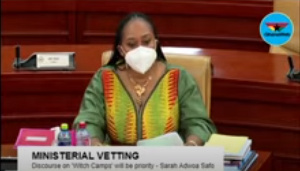Regional News of Wednesday, 7 July 2021
Source: GNA
Minister urges families to bond
Madam Sarah Adwoa Safo, Minister of Gender, Children and Social Protection(MoGCSP) has urged families to keep bonding for a better country.
She said the successes of countries had depended on the responsibilities of families, the most important human institution because it was the basic and natural unit of society, which played a critical role in perpetuating society through the socialization of its members.
She made the remarks in a speech read on her behalf by Madam Lariba Abudu, Deputy Minister of Gender, Children and Social Protection, (MoGCSP)at the launch of the Caregivers of Children Training Manual and Policy Documents in Accra by the MGCSP in collaboration with the Judicial Service, Ghana Statistical Service with support from the United States Agency for International Development (USAID) and United Nations International Children Emergency Fund (UNICEF).
Madam Safo said without strong family ties, there would be many problems, and the Ministry could not achieve its mandate without families, hence in their effort to give a better life to the orphaned, vulnerable and missing children, they had found families for them.
This, she said, was the reason for the implementation of the Deinstitutionalization program which would reform child care systems and close down orphanages and children's institutions, find families for children currently resident, and set up replacement services to support vulnerable families in non-institutional ways.
She said challenges families faced, especially low-income families were becoming more complex with megatrends including new technologies, demographic shifts, rapid urbanization, climate change, and migration had dramatically shaped the world and affected family cohesion.
She said, in the quest for families to bridge the inequality gap, many children had been found on the streets in the major cities of the country, saying however that Government had been working hard to find a solution to it.
“Last year, we took 175 children off the street and we are still working to ensure all stakeholders take up their responsibilities to remove the over 4,000 children found on the streets,” she said.
She called for new strategies to improve family cohesion and strengthen their protection roles in line with the legal framework, and appealed to parents to still keep close bonds in the changing world, especially with their children, guiding them against the megatrends that had made some children vulnerable to predators.
Madam Mary Addo-Mensah, USAID, Ghana Acting Health Office Director, said the U.S. Government's investments in child health and wellbeing spanned sectors, hence USAID, in partnership with UNICEF, had supported Government to develop national guidelines and a regulatory framework for children's residential homes.
She explained that the guidelines would assist Social Welfare Officers better handle cases of children in need of alternative arrangements and improve and standardize childcare practices within residential homes, with an emphasis on children with physical disabilities.
Adding that, the tools would also help formalize the foster care system to provide higher quality services for vulnerable children.
Madam Addo-Mensah called on stakeholders to work together to ensure that social welfare officers and caregivers adhered to the manuals, guidelines, tools, and regulations to provide quality services for vulnerable children across the country.
“Over the next five years, we will continue to partner with the Ministry, to strengthen the social protection system to respond better to and protect vulnerable populations from harmful practices such as children and gender-based violence, Our goal is ultimately to transition children to a supportive family environment,” she said.
Mr Muhammed Rafiq Khan, Chief, Child Protection, UNICEF, said findings from Children living in residential care in Ghana Study revealed that about 3,530 children were living in 139 residential homes, of which only a third had a valid license, about 2 in 3 children have at least one living birth parent, and on average, had stayed for ten years in a residential home.
He said the reasons for placement included families’ inability to cater for the children due to the death or illness of a parent, and often due to a lack of access to education, health care, and family support services.
Mr. Khan said some children had been housed because of a disability or had been in contact with the law while others because they had experienced violence, abuse, neglect, or drug addiction in the family.
The tools were developed as part of a program to accelerate the Care Reform Initiative between the Governments of the United States and Ghana to ensure that children were living in a protective and loving family.
The policy document included the Probation Manuel, National Standards for Foster Care in Ghana, Training Manual for Caregivers of Children with disabilities, and Strategic Plan for the Department of Social Welfare.
Entertainment










